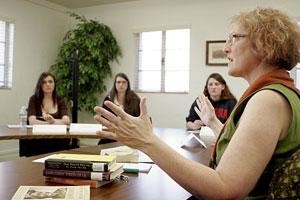Ever wish the reading load for your classes could be lighter, so you could spend time doing, well, just about anything else?
Some would spend that time sunbathing, sleeping or scrambling to meet school or work deadlines. Others might simply sit back, relax and enjoy a good book.
One class of Honors College students is assigned to do just that.
For one hour every Tuesday, 11 students in Honors 295R gather at a roundtable in the Slonaker House to discuss books of their choice, but with a very specific goal in mind: to select the novel Honors college freshmen will get at orientation.
For the past two years, these freshmen have been given a paperback novel to read over the summer.
It was only last year that students made the choice, said Barbara Whittlesey, administrative associate for the Honors College.
“”It’s important that students choose the book because the administration aren’t reading the books, the students are,”” said Christine Filer, a pre-communication sophomore and student in the course. “”We know what it is like to be a freshman in the twentieth century.””
Once the students arrive in the fall, they can participate in discussion groups, film screenings and other events designed to create a sense of community among the newcomers and their older peers, said Patricia MacCorquodale, dean of the Honors College Dean.
“”(The resources help) freshmen acclimate to our college by furnishing them with the tools necessary to develop a strong sense of intellectual curiosity, which is absolutely vital for success both in college and beyond,”” said Lon Huber, a public administration senior and student in the course.
This year’s selection was Tamin Ansary’s “”East of Kabul, West of New York.”” The Honors College arranged for Ansary to come to campus in October to speak to more than 300 students at the Family Weekend convocation.
During each class session, the students present reviews on the various books they have been reading that week. The class starts from a list of about 200 books and narrows it down continually throughout the semester.
“”(Whittlesey) expects us to read about eight books a semester, but I know there will be some people who will read 17 and others who will read 2,”” Filer said. “”You don’t have to read each book all the way through. If you start reading a book and can tell that it won’t work, you don’t have to finish it.””
The baseline requirements for the chosen book are that it has to be interdisciplinary, paperback and relatively short.
Other criteria established by the class relate to how engaging the theme is, the timeliness of the subject matter and the relative objectivity of the narrator.
“”I mainly look for good themes, interesting characters, current or famous events and subjects that deal with growing up and adjusting to change,”” Filer said.
Each year, the Honors College spends about $8,000 purchasing books for the incoming freshmen, MacCorquodale said.
Though the assigned reading isn’t required, MacCorquodale said she hopes the new students will take advantage of the opportunity they are being presented with.
“”(Reading) gives everybody a common experience,”” she said. “”It gives people something they can talk about initially with other people.””









